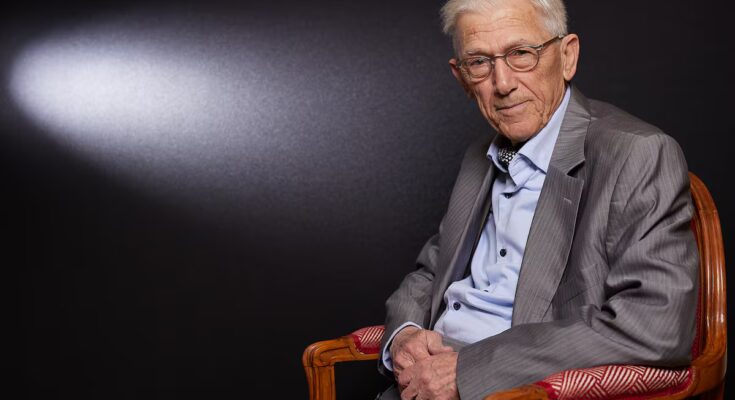Theodor Kallifatides (Molaoi, Greece, 87 years old) is a son of Greek sadness, that desolate country he knew as a child, when at the age of five he witnessed the execution of a man at the hands of the Nazis who devastated his country and his childhood.
Another life to live It was his first book published in Spain (by Galaxia Gutenberg, which publishes all his works). The book he presents in Madrid, as part of the Eñe Festival with the Portuguese writer Lídia Jorge, is A woman to lovein the wake of his return to the Greek of his life.
He has lived in Sweden since at the age of 25 he moved away from that memory that marked his life: the pain that sent so many into exile, which marked his life since childhood and which for years prevented him from writing in his language. Another life to live (2019) recovered it for their language.
Football was once his childhood passion, and this is how he remembers it. “The first time I saw someone play football I was six or seven years old and the Germans had invaded Greece.” The world war arrived at his home, in Greece, in the world, when he was a boy who already at the age of five saw on the street a murder organized by the German army which devastated his country and blackened the world he saw.
“Sometimes the Germans played football, even against the citizens. I didn’t play, I was little. But I started playing when we moved to Athens, with the neighborhood kids, with a rag ball. I discovered I was left-handed, which allowed me to join the local team. Then I tried my luck with the Panathinaikos youth team. I played there until I was eighteen. It took studies and two and a half years of military service.”
At that time he was very aware of what was happening in his country. “Poverty, persecution, fear and anguish. Mothers, fathers, have always lived in anguish for the child: ‘where is the child, what happened to him’… After the German occupation came the civil war, the cruelest of all wars.” There were bullet marks on the walls of his school. “You saw the consequences of the war, the wounded, the people without legs, without arms, without eyes, the war. They became beggars. There was no work. These people could not afford to laugh. It was not possible for them to be happy even for a second.”
It is the landscape of his memory. “The first thing I wrote was after I saw the execution of that man at the hands of the Germans. He was an innocent man, the madman of the village. They executed him and forced the whole village to contemplate that evil that marked my life forever. My mother and I were at home, I was five years old, my father was in prison. We didn’t know where my two older brothers were. So my mother had to take me to the execution and we watched together. That man, when he fell… his eyes met the When I got home something happened that afternoon. I didn’t go to play. I never read it again. When my father got out of prison a few months later, he didn’t say anything, he touched it to me and put it in his pocket.
“Did you never tell him what you yourself had written on that paper?”
“I don’t think he could.” He was so moved that he couldn’t open his mouth. This is my explanation. As time went on, this stopped being important.
Kallifatides says his father always supported him. This gives the young Kallifatides a peculiar certainty: “I am not a writer because my father was one, nor because I belong to a privileged class… no. I am a writer because I couldn’t be anything else. This has remained true throughout my life, even if I did other things: teaching in schools, universities, managing magazines, even if I wasn’t able to dedicate myself to writing on my own and abandon everything else until I was sixty. And having the support of my father and my mother was a great thing for me value. Having a good review is nice, but having your mother like your book…”
In Another life to live, Callifatides became a Greek writer. A woman to love It takes him back to his country… and to Stockholm. “They are children of the same emotion. The latter is about love, not that of an erotic relationship, but love, love for another human being. Like what we feel for a mother. It is a huge step in our development to get to the point where you understand the qualities of another human being. Because you know the qualities of a mother from the moment you are born. A mother’s hands are never cold.”
In Another life to live the writer returned to his native language. He had not broken with the language only because of exile, but because of the feeling that his language was used to tell lies, to accuse his father of being a communist, to condemn his brother to death for refusing to rape some prisoners of war… “I decided that if I ever wrote I would only do it to tell the truth. This is what I look for as a writer, not to rearrange reality. What is the truth about these years, about the German occupation, about love? Language is the main part of our thinking. As we say in Greek: ‘You have to call a fig’. When I arrived in Sweden and changed the language it was because of this: because I wasn’t sure I could write the truth in Greek.”
Kallifatides has written more than twenty books in Swedish. Those books changed him a lot, but he doesn’t know exactly how. “I remained a teacher’s son, my mother’s son. This is who I am and it hasn’t changed. That certainty was what allowed me to quickly adapt to the new language. It’s a language I loved from the beginning, first just for the sound. Then as a way of thinking. In Swedish, for example, if you don’t like something, you can’t criticize it, but say: ‘I don’t say anything about it, so I didn’t say anything’. This doesn’t work in Greek. It only works in Swedish! Also, I lived in Sweden, the my “My wife was Swedish, my children were Swedish, I worked with Swedes at university or in literary magazines… Swedish took over from me,” he explains. Although there is something problematic in this: you always have the feeling that the language is bigger than you. And this is not a good feeling for a writer! hic Rhodus, hic saltus: This is Rhodes, this is where you jump. I had to prove that I could jump in Swedish.
I decided that if I ever wrote it would only be to tell the truth. That’s what I’m looking for as a writer, not to rearrange reality.
Kallifatides is 87 years old and his latest book, A woman to love, talks about love (“a kind of quiet harmony”) and also about the death of the loved one: “You have to make decisions. Make the decision not to be lovers. Love each other but not be lovers. I can live with that. I don’t even think that having a ‘romance’ is the best thing that could happen. It became, and that’s how I wrote it, a strong affinity between two people who loved and respected and supported each other without having a sexual relationship. It’s not that difficult.”
The world overwhelms him, he is destroyed. His civil hope is shattered and he appears desperate and perplexed. “It’s hard for me to understand,” he says, “that after the Second World War there are fanatics again, people willing to go to war, who make weapons so that what happened in Chekhov’s work can happen: if a gun appears on the scene, soon someone will end up shooting it. Yes, these are sad times.”



